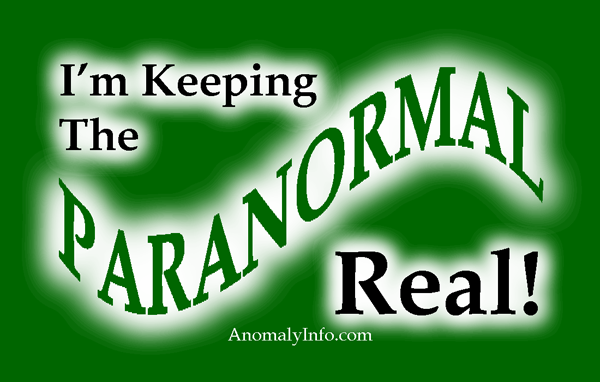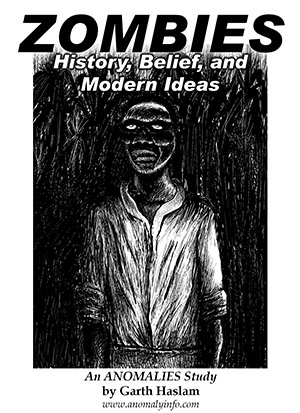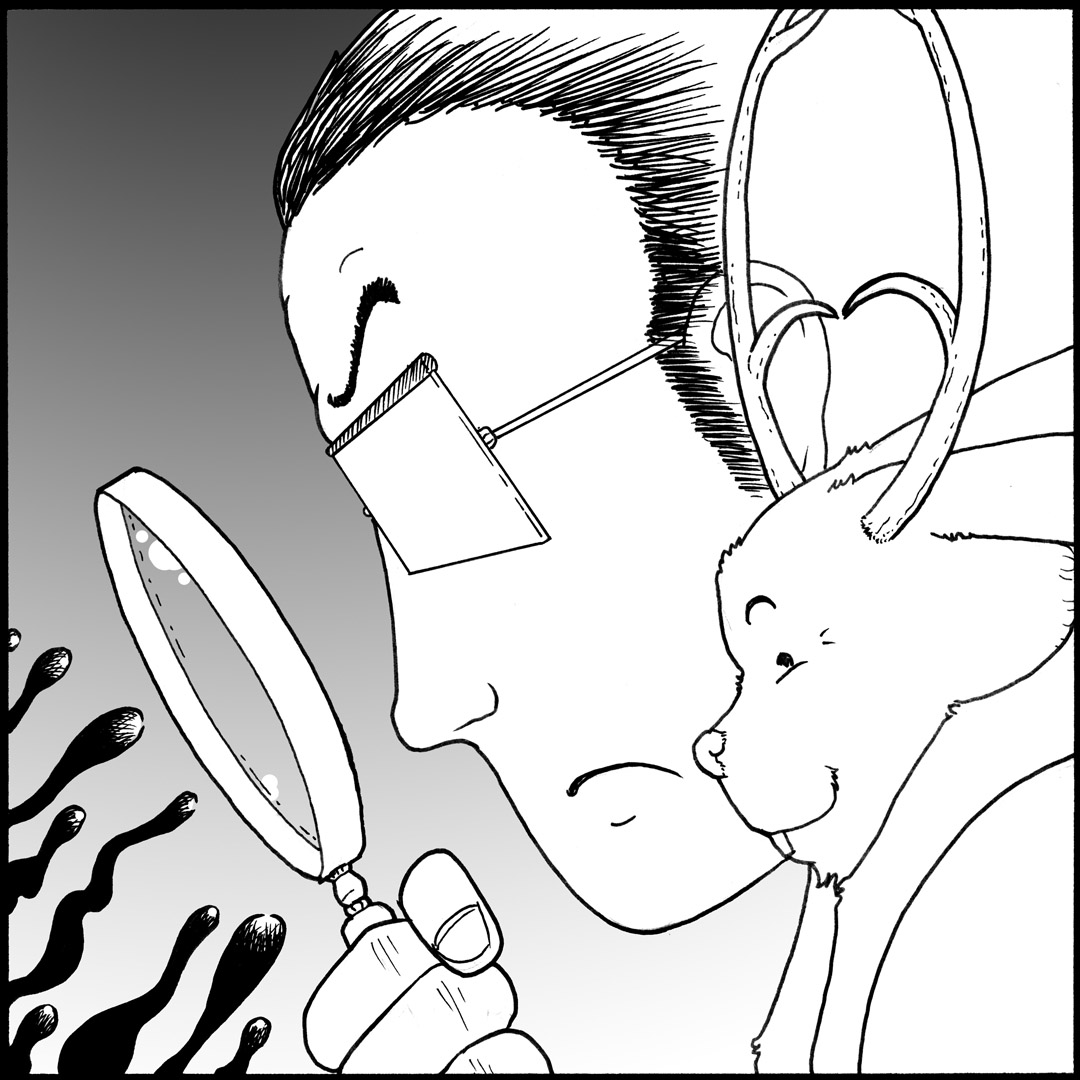1873: The Unsolved Riddle of Bishop Wilberforce
The Legend:
Bishop Samuel Wilberforce [1805-1873], the man who famously had a public debate to try to discredit Darwin's theory of evolution, was also the creator of many poems and poetic riddles that delighted children and adults of his time. Of all the poetic riddles he published, each had a singular and clever answer eventually revealed by the Bishop, usually after a little time had passed for the public to forward their guesses... but one riddle was never answered.
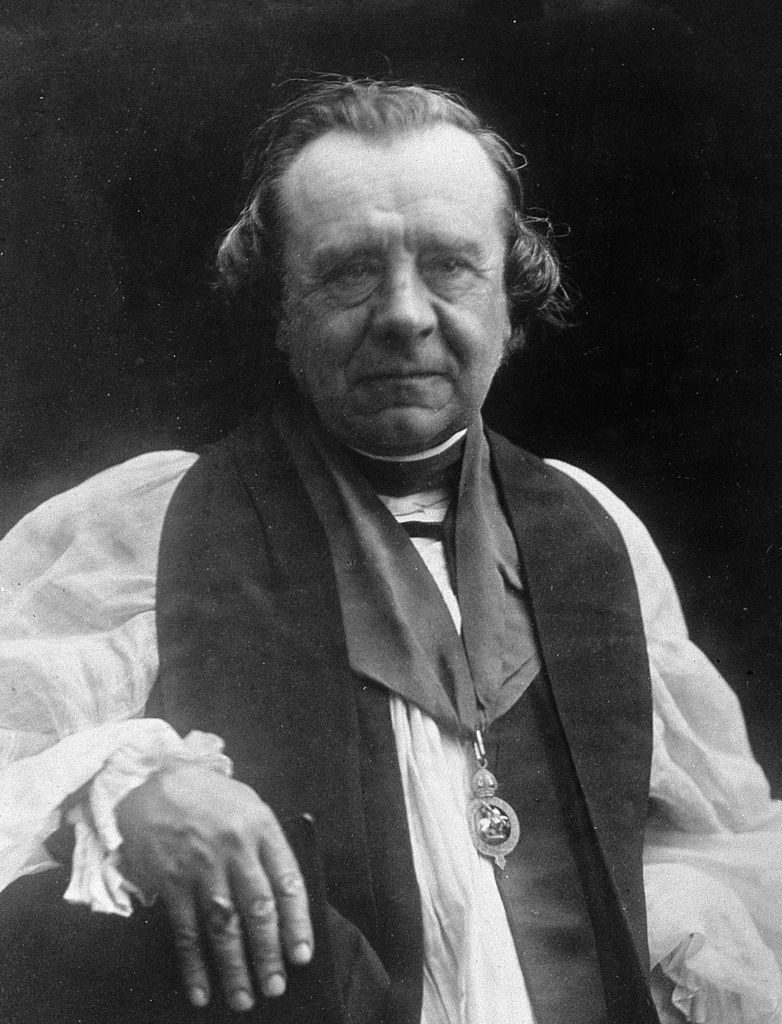
Bishop Wilberforce, date unknown. [Larger version here]
Perhaps the reason for this is that the Bishop never had a chance to reveal his answer, since the riddle itself seems to have only been published as of 1873... the year in which he died. The riddle runs thus:
"Sweetest of sound, in orchestra heard,
Yet in orchestra never have been,
Bird in light plumage, yet less like a bird,
Nothing in nature has ever been seen,
On earth I expire, in water I die,
Yet I run, swim and fly,
If I cannot be guessed by a boy or a man,
A girl or a woman I certainly can!"
Many guesses have been made over the past century, but none seem to fit all the details exactly... has the true answer forever vanished with the death of its creator?
Deeper Quandaries than First Supposed
Simple a situation as the above sounds, I still wanted to confirm the facts of the matter... and I found that there are more questions attached to the story then are at first apparent. So, please let me briefly add to the puzzle:
- The above is neither the complete riddle, nor the earliest form of it.
- There are four 'unsolved' riddles attributed to Wilberforce.
- Wilberforce almost certainly had nothing to do with the creation of any of them.
- All four have answers that were printed over one-hundred years ago.
And now, let's step through this odd set of problems, one at a time... though not in the above order.
Credit, Where Credit was NOT Due
Bishop Samuel Wilberforce was a gifted public speaker and talented in many ways; but poetry and riddles do not seem to be on the list. A survey of three different biographies of the man, all written after his death and two in conjunction with his son, Reginald, shows absolutely no reference made to the Bishop ever writing poems or riddles. Only one of the three notes he loved to crack a good pun whenever he saw a likely opportunity when not addressing a group formally, but this is not the same as writing riddles and submitting them for publication. Wilberforce did write Agathos & Other Sunday Stories [published in 1842], which is a book of stories intended for parents to read to children that were collected from the stories Wilberforce himself invented on Sunday evenings for his children; but this volume contains nothing that rhymes.
Much to my surprise, I found that as I looked for the oldest publication of the riddle in question (as well as three others later attributed to Wilberforce), I found that it was apparently something of a common practice to attribute poems and riddles of unknown origin to well-known -- and dead -- clergymen, who were remembered as engaging public speakers. This appears to have been a habitual assumption between 1860 and 1880 for some reason, and this habit slowly attached poetic riddles of unknown origin to the best remembered of the clergymen over time -- Bishop Wilberforce -- likely because of his public debate with Thomas Huxley over Darwin's theories making him more memorable in the long term. In addition, apparent proof that Wilberforce had written poetic riddles surfaced in 1879.
The Marvellous House
Six years after Wilberforce's death, a book for children entitled The Marvellous House; or The Bishop's Enigma was published. Written by a man named Henry C. Linstead, the book carried the claim of being "founded on a riddle by Bishop Wilberforce"... and note that the gold print on the cover makes it look like the whole book was written by Wilberforce!
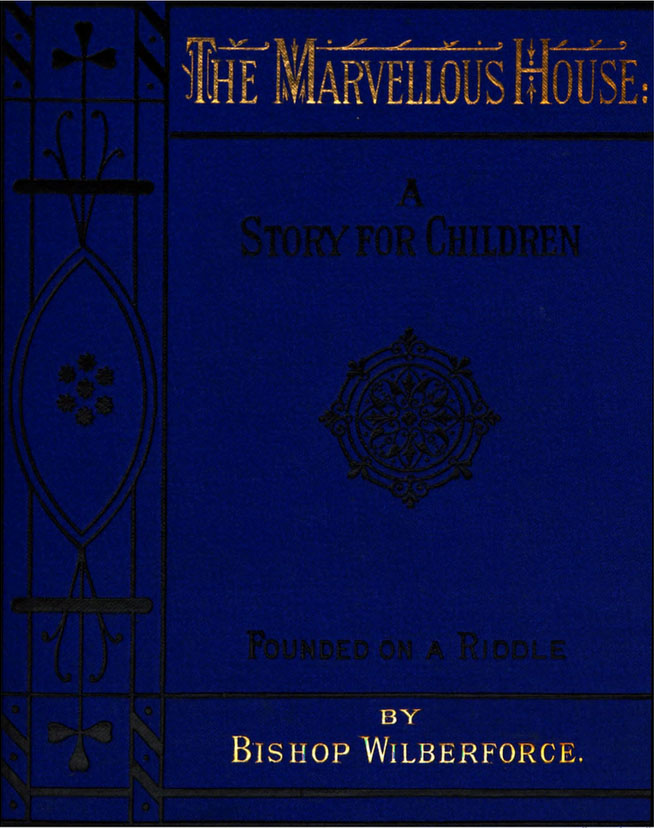 Cover to The Marvellous House. [Larger version here]
Cover to The Marvellous House. [Larger version here]
According to the introduction, graciously written by a friend of the author, many compositions of Bishop Wilberforce had only ever been shared verbally among his friends; and, conveniently, Linstead met one of those people who had remembered a long poem riddle composed by Wilberforce and recited before her. Linstead wrote his book around this poetic riddle, and was clever enough to not only answer the riddle, but to also do it in rhyme. [Read the Riddle and Solution Here.] So The Marvellous House essentially told everyone that Wilberforce composed poetic riddles, and displayed an example... which likely had the subtle effect of confirming his proposed authorship of any other poetic riddle attributed to him.
There was only one problem: Wilberforce didn't write the poem. Neither did Linstead, actually.
The poetic riddle, and the poetic solution, featured in The Marvellous House had both been published twelve years earlier, in 1867, in The People's Magazine. This published version is actually longer than what appeared in Linstead's book, but has exactly the same starting lines... so whether Linstead 'borrowed' the riddle from this magazine or actually heard it from someone else later, it's undoubtedly the original source for the riddle he attributed to Bishop Wilberforce. Which is funny, because The People's Magazine claims the poetic riddle was composed by a clever correspondent, based on a prose enigma written by Bishop Wilberforce. So while Wilberforce may have come up with the initial idea for the riddle, the poem form of it was actually written by someone else. [Read this Riddle and Solution Here.]
In looking through old publications, I found that many old poetic riddles had a history of being submitted to magazines to inquire for solutions, with no known author attached. This was certainly true for the riddle that began this study -- "Sweetest of sounds in orchestra heard" -- but by 1883, likely helped by the claims made in The Marvellous House, correspondents to magazines now generally attributed the riddles they wanted an answer for to Bishop Wilberforce. So by the 1880's, a general assumption had settled that attributed most unsolved poetic riddles to Wilberforce... though there was still no evidence to suggest he'd ever written any.
The OMNI Contest
In the December 1980 issue of Omni Magazine, in the Games section, the topic of Bishop Wilberforce and riddles was visited in the form of a contest. Scot Morris, the author, started the section by introducing Bishop Wilberforce to a generation of readers who likely didn't know who he was; in all, only two things are told about the man. First, that he had a famous debate with Thomas Huxley over Darwin's theory of evolution, and second, that he wrote poetic riddles... which was then followed with the main riddle from The Marvellous House as proof of the second statement.
In addition, Morris had been in communication with Dr. Richard Wrangham who claimed to be distantly related to Bishop Wilberforce, and who supplied Morris with four poetic riddles found in the Bishop's papers. These four riddles were then presented to readers as being "well over a century old and have[ing] no known solutions." The contest was simple: send in your answers, best ones win. The four riddles that the Omni contest attributed to Wilberforce -- of which the first should look familiar -- were:
RIDDLE #1
I'm the loudest of voices in orchestra heard
But yet in an orchestra never was seen;
I'm a bird of gay plumage, but less like a bird
Nothing in Nature ever has been.
Touching earth I expire, in water I die,
In earth I lose breath. I can swim, I can fly.
Darkness destroys me and light is my death;
I can't keep alive without stopping my breath.
If my name can't be guessed by a boy or a man,
By a girl or a woman it certainly can.
RIDDLE #2
Man cannot live without my first;
Both day and night 'tis used.
My second is a thing accursed,
Both day and night abused.
My whole is never seen by day
And never heard at night.
'Tis most desired when far away
And hated when in sight.
RIDDLE #3
Not newly formed, yet made today,
And most in use while others sleep,
What few would wish to give away
And none would wish to keep.
RIDDLE #4
I'm just two and two; I am hot, I am cold.
I'm the parent of numbers that cannot be told.
I am lawful, unlawful, a duty, a fault,
And often sold dear, good for nothing after bought,
An extraordinary boon -- a matter of course --
And yielded with pleasure when taken by force.
The response to the contest was unexpectedly large and creative; the results were not published until seven months later, in July. Three judges picked the best answers given for each, then a random winner was taken from the piles of letters that gave the same best answer... and the judges also believed the riddles were initially unsolved and written by Bishop Wilberforce. Which they weren't.
But if Wilberforce didn't write the riddles, how could they be found in his papers? Well, he didn't write poetic riddles, but he does seem to have liked them... there is at least one letter written by Wilberforce in 1863 to a colleague to ask if his friend had written just such a riddle and to try to find what the answer was; so Wilberforce was as interested in the riddles as anyone else at the time. That a few would turn up in his papers -- which includes private notes and letters to friends -- shouldn't be a surprise. So there is still no evidence that Bishop Samuel Wilberforce wrote any of the poetic riddles. So, now that we're done with that topic, shall I tell you the answers to all four?
The Four "Unsolved" Riddles... and their Answers
Formed Long Ago...
We'll start with this one, very well-known now because it is included -- along with its answer, by the way -- in many "Mother Goose" collections.
Formed long ago, yet made to day,
Employed while others sleep;
What few would like to give away,
Nor any wish to keep.
The earliest I've found this rhyme is in J.O. Halliwell's famous collection The Nursery Rhymes of England, published in 1844. Halliwell collected the rhymes from nurses who sang them to children, and was the first person to record many of them; his books, in fact, are what sparked interest in nursery rhymes and spawned the "Mother Goose" books in England and America from that time on, all of which led to Halliwell eventually being dubbed "Father Goose" by fans and admirers.
Of 1,000 responses from Omni readers in 1980, 255 got it right... the answer to this riddle is, of course, a BED.
I'm Two and Two...
The earliest I found this riddle was in an 1829 copy of "The Ladies' Pocket Magazine," where it is rendered thus:
I'm just two and two, I am warm, I am cold.
And the parent of numbers that cannot be told;
I am lawful, unlawful, a duty, a fault;
I'm often sold dear, good for nothing when bought;
An extraordinary boon, and a matter of course,
And yielded with pleasure -- when taken by force.
The answer, given many pages later and which may strike you as politically incorrect now, is A KISS. Most of the OMNI readers in 1980 had some variation of this as the answer -- a kiss, sex, passion, love -- but most were apparently put off by the final line, which was probably more appropriate and true in 1829 then it is now.
Men Cannot Live Without My First...
The earliest direct printing of this riddle I could find is in an issue of the Athenaeum from February 2, 1867, where a inquiry for an answer was sent by a "G.H.". Interestingly, he attributed the riddle to "the late Archbishop Whately," whereas six years later in 1873 an editor in the Huddersfield College Magazine claims the riddle is attributed to "the late Bishop Wilberforce"... what a difference six years can make!
This riddle probably has the best possible proof that Bishop Wilberforce didn't compose it of all the riddles here. In a letter dated March 19, 1863, Bishop Wilberforce wrote to J.C. Wigram, the Bishop of Rochester, to note in part that "I have today received 'The Bishop of Rochester's Riddle' beginning 'Men cannot live without my first'. Is it yours? & if so what is the Answer. Please to tell me here."
The riddle as G.H. presented it ran thus:
Man cannot live without my first,
Both day and night 'tis used;
My second is by all accursed,
By day and night abused.
My whole is never seen by day
Nor ever used by night;
'Tis dear to friends when far away,
But hated when in sight.
A year later, almost to the day -- on February 1, 1868 -- a second letter from G.H. was printed, this one including an answer to the riddle that a friend of his had given him... and I know already not many of you are going to like it or agree it's the right answer. If nothing else, we can consider it the earliest attempt known at an answer; it, too, is a rhyme:
ANSWER.
Ignis, or fire, all men will own
Essential to the life of man;
Fatuus, or fool, has been, 'tis known,
Cursed and abused since time began.
Some Ignis Fatuus — Wlll-o‘-Wisp,
Not seen by day, nor used by night.
Men love, and for their phantom list,
When ’tis unseen, but hate its sight.
So basically, he says the answer is FIRE in a variety of forms. The 1980 Omni readers were all over the place in their answers; the judges finally decided that the best sent to them was 'firefly,' which may also not satisfy you. So we can probably continue to treat this poetic riddle as unsolved; but we can no longer pretend it was written by Bishop Wilberforce.
Sweetest of Sound in Orchestra Heard...
The earliest presentation I've found of the initial rhyme that started this whole investigation is from 1864, in a magazine called The Family Friend, under a section on "Enigmas, Charades, &c.," where it is presented in the introduction to the article as an example of a poetic riddle that has both an unknown author and unknown answer:
I'm the sweetest of voices in orchestra heard,
And yet in an orchestra never have been;
I'm a bird of bright plumage, and less like a bird
Nothing in nature has ever been seen.
Touching earth I expire, in water I die,
In air I lose life, yet I run, swim, and fly,
Darkness destroys me, and light is my death.
You can't keep me alive but by stopping my breath.
If my name can't be guessed by a boy or a man,
By a girl or a woman it easily can.
The riddle turned up again in 1866 in the Monthly Packet of Evening Readings for Members of the English Church (whew!). It's presented with no story, just as a riddle to ponder, and signed off by "E.A.S.":
ENIGMA.
I am loudest of voices in orchestra heard,
And yet in an orchestra never have been;
I'm a bird of bright plumage, and less like a bird
Nothing in nature has ever been seen.
Touching earth, I expire; and in water I die;
In air I lose breath, yet can swim and can fly;
Darkness destroys me, and light is my death,
Yet I can't keep alive without stopping my breath;
If my name can't be guessed by a boy or a man,
By a girl or a woman it certainly can.
The answer, as such, was provided two months later (this time signed off by "E.B.K."), also presented in rhyme:
'TIME.'
I'm beaten, I'm counted, until deadened the sound
Of violin, trombone,
Flute, psaltery, and drum;
Yet in propria personâ I am not there found.
Some talk of my wings, brightly tinted with gold—
For so quickly I fly,
Bringing pleasure and joy.
Yet I'm not a bright bird—I'm shrivelled and old:
I carry a scythe,
And painfully writhe.
Man, woman, and child,
The grave, and the wild,
All lie pale, without motion, and cold.
But if I thus kill, I myself suffer loss;
When the earth's years are o'er,
Then shall I be no more,
And all that is good will be cleansed from its dross.
I'm engulfed, I am past,
No thought on me is cast
When each gentle breeze vibrates; when rough winds roar,
I'm exhausted, I perish,
And like a ghost vanish;
Though I swim and I fly,
Yet in these I must die,
No pang of remorse can bring me back more.
The earth in its daily course turns from the sun:
Man much needeth the night;
But, oh! sad is my plight,
For extinction to me has certainly come.
The daylight returns to gladden man's heart.
I've been born and have died,
Death is still at my side,
Though in man's joy and pain I must bear my part.
Time must constantly die,
With swift wings from us fly;
Then his forelock pray seize,
In sloth think not there's ease,
Forget not that you too must depart.
Right. So the answer given was TIME. By 1886 this answer was apparently forgotten, because a correspondent wrote to Notes & Queries in that year to ask for the answer to the riddle, which was now attributed to "Dr. Wilberforce, late Bishop of Oxford"... and it's been treated as unsolved ever since, far as I can tell.
The Omni readers in 1980 had an entirely different take on the initial riddle as it was presented to them; the answer the judges picked out from all the entries as the best was 'whale.' The argument for this line of logic was that 'ORC' was the most prominent sound in the word 'orchestra', which could relate to the Latin word for whale, 'orca'; a plume of water spouted by a whale could be described as "plumage"; whales die when beached, and the rest die naturally in the water; a breaching whale could be said to "fly"; whale oil banished darkness when used in lanterns, but required a whale to die to be harvested; and whale bone was a common component of corsets worn by women. I'll add to those observations that a whale must hold it's breath or drown... which could explain the line "Yet I can't keep alive without stopping my breath."
So this particular poetic rhyme has two proposed answers -- pick a favorite, or think of a better one. But it also has no evidence that Bishop Wilberforce created it.
Anomalies -- the Strange & Unexplained, as well as my other website -- Monsters Here & There -- are supported by patrons, people like you! All new Anomalies articles are now posted for my patrons only, along with exclusive content made just for them. You can become a patron for just $1 a month!
|



